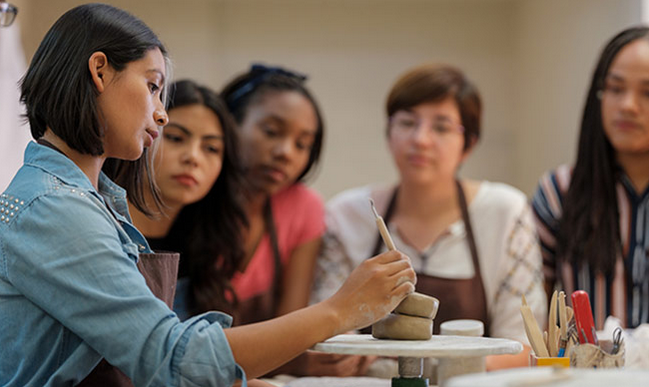|
Getting your Trinity Audio player ready...
|
Art has always held a special place in human culture. It’s a means of expression, a reflection of society, and a source of inspiration. For many, art isn’t just a hobby; it’s a lifelong passion and a potential career. In this article, we’ll explore the world of art education and careers, shedding light on how pursuing your artistic inclinations can lead to fulfilling and rewarding professional opportunities.

The Value of Art Education
Art education lays the foundation for artists and creative minds.
Developing Technical Skills
One of the primary benefits of art education is the opportunity to develop and refine your technical skills. Art schools offer a structured environment where you can hone your abilities in various mediums. From mastering the intricacies of oil painting to perfecting digital illustration techniques, formal education equips you with the tools needed to bring your artistic visions to life.
Expanding Creative Horizons
Art education isn’t just about technique; it’s also about nurturing creativity. Through coursework, exposure to different artistic styles, and interaction with fellow artists, you’ll broaden your creative horizons. You’ll experiment with new ideas, explore unconventional methods, and push the boundaries of your artistic expression.
Constructive Critique and Feedback
Critique is a part of the art education process. Instructors and peers provide feedback on your work, helping you identify strengths and areas for improvement. Learning to accept and apply critique is a valuable skill that will serve you well throughout your career.
Art Degrees and Specializations
Art education offers a range of degree programs to cater to diverse interests. Here are some common options:
Bachelor of Fine Arts (BFA)
A BFA program provides an education in various art disciplines, allowing you to explore different mediums and techniques. It’s an excellent choice if you’re seeking a well-rounded art education.
Bachelor of Arts in Art History
This program delves into the evolution of art styles, artists, and movements, preparing you for careers in curating and art criticism
Master of Fine Arts (MFA)
An MFA program is ideal for artists looking to specialize in a particular medium or style. It’s a degree that often culminates in a thesis project or exhibition, showcasing your prowess.
Graphic Design
If your passion lies in visual communication, a degree in graphic design can lead to a career in branding, or web design.
Animation
For animators and digital artists, programs in animation provide the skills needed to create visuals for films, video games, and projects.
Navigating Your Art Career
Art education serves as a launchpad for your career, but the journey doesn’t end with a diploma. Here’s how to navigate the art world and transform your passion into a sustainable profession.
Building a Portfolio
Your portfolio is your calling card in the art world. It shows your best work your range and your style. Continuously update and curate your portfolio to reflect your growth.
Networking
Networking is crucial in the art industry. Attend exhibitions, art fairs, and gallery openings to connect with fellow artists and potential clients. Online platforms like Instagram and Behance can also help you gain experience.
Freelancing vs. Full-Time
Decide whether you want to pursue work or seek full-time employment. Freelancing offers flexibility but requires self-promotion and business acumen. Full-time positions provide stability but may limit creative freedom.
Embracing Digital Tools
In today’s digital age, familiarity with digital tools is crucial. Graphic design software, digital drawing tablets, and 3D modelling programs are valuable assets for modern artists.
Art Education and the Changing Landscape
The art world is changing with technology playing a pivotal role. Digital art, NFTs (non-fungible tokens), and virtual reality exhibitions are reshaping how artists create their work. Stay informed about these advances to remain crucial.
Art Therapy
Art education can lead to a career in art therapy. Therapists work with individuals facing various emotions or challenges, using art as a therapeutic tool. This profession combines artistic skills with a deep understanding of human emotions, making it fulfilling.
Art Education for All Ages
Many institutions offer art classes for individuals of all ages and skill levels. These programs allow people to explore their creativity, learn new techniques, and find relaxation through art.
Residencies and Grants
Artists often seek residencies and grants to further their careers. Residencies provide dedicated time and space for creative work, while grants offer financial support for projects. Both can significantly boost a profile and development.
Conclusion: Your Artistic Journey
Art education is an experience that equips you with skills, and knowledge. It’s a stepping stone to a world of artistic possibilities. Whether you dream of exhibiting in renowned galleries, designing for global brands, or teaching the next generation of artists, your art education is the brushstroke that paints the canvas of your creative career. Embrace it, refine it, and let it guide you toward a future where your passion and profession converge.

